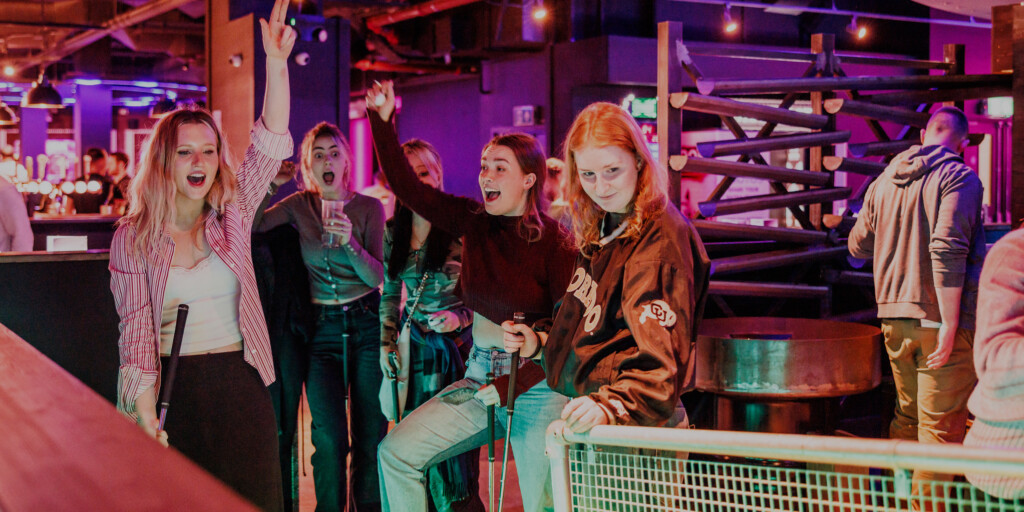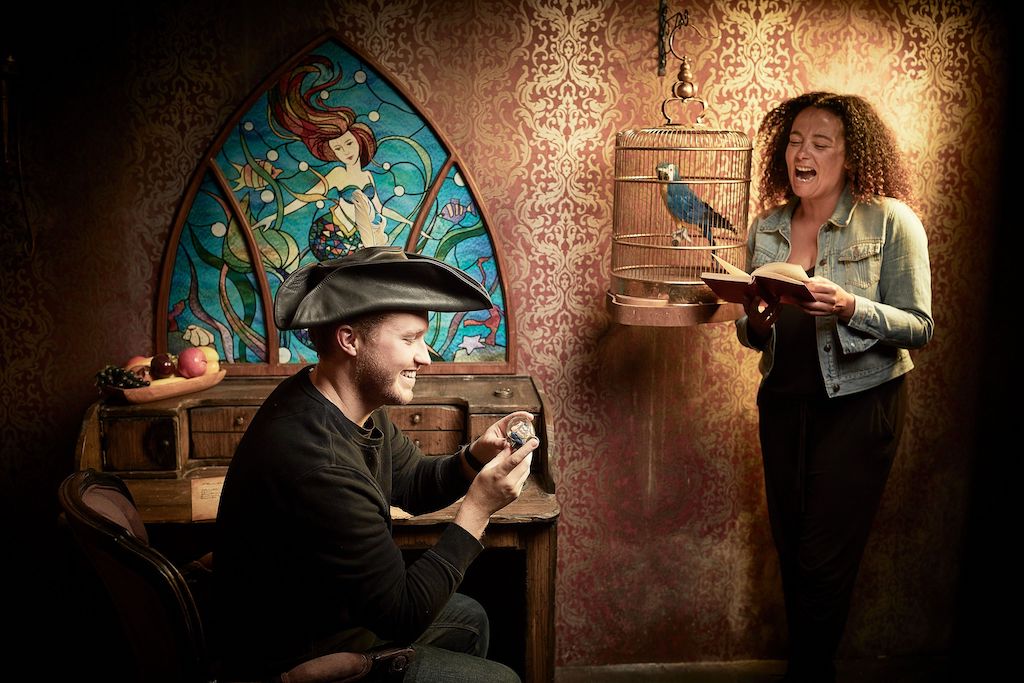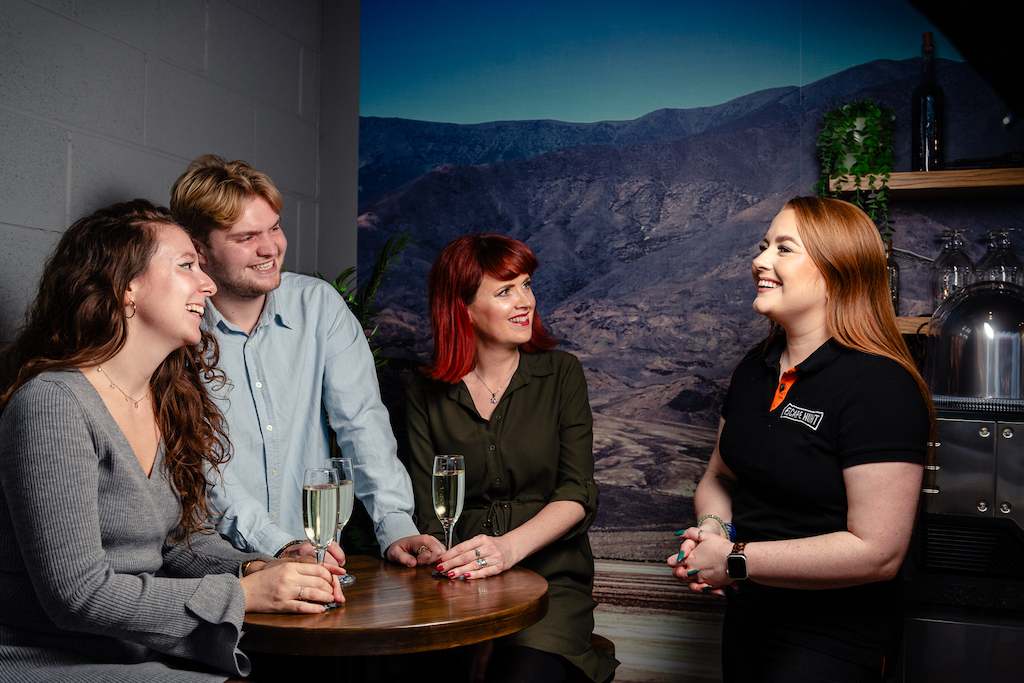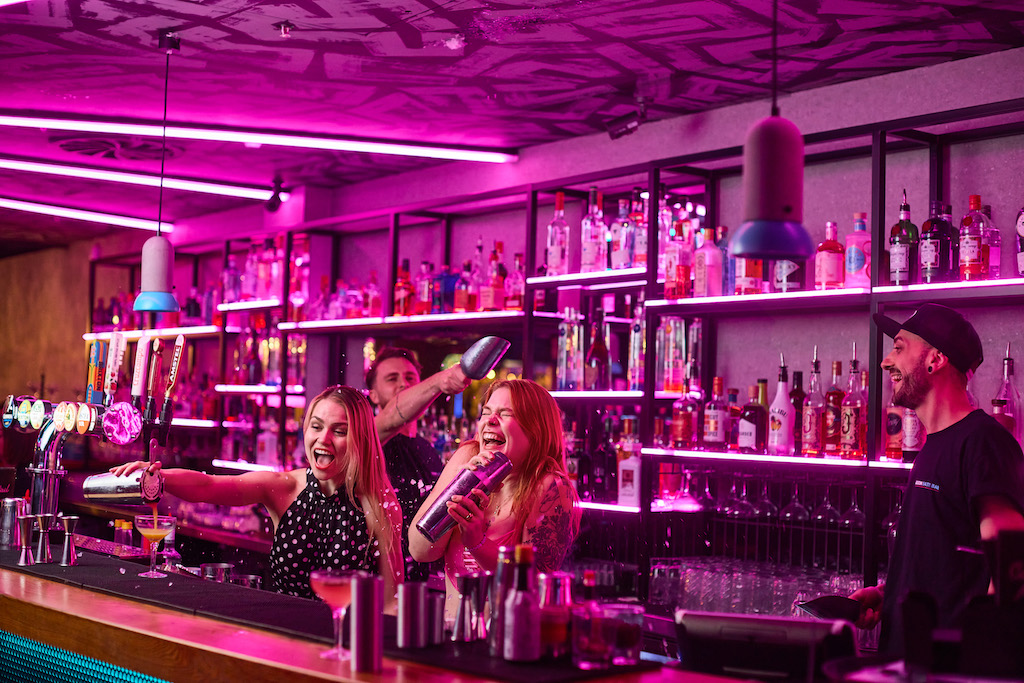XP Factory, currently experiencing transformational growth, operates two experiential leisure brands. These are Escape Hunt, the leading provider of Escape Room experiences with 21 owned/operated sites in the UK, and another three owned/operated sites in Dubai, Brussels, and Paris, as well as a network of around 20 franchised sites, and Boom Battle Bar, a popular competitive socialising brand with almost 30 venues in the UK and one in Dubai.
Richard Harpham, CEO at XP Factory, spoke to blooloop about Escape Hunt and Boom Battle Bar, discussing the company’s impressive growth, and what we can expect going forward.
“We feel if I’m honest, privileged,” he tells blooloop. “The next update, which will be put out in January, should see us hit 45 million pounds worth of sales by the end of the Christmas period, and five and a half-ish million pounds of EBITDA. Growth has ramped up over the last few months. It’s a testament to some unbelievably hardworking, very dedicated team members. It’s wonderful, from their perspective as well, to see it start to come good – it’s been a fun ride.”
The XP Factory brands
Commenting on the first of the two brands sitting under the XP Factory umbrella, he adds:
“Escape Hunt has been a wonderful business to curate over the last six years or so. We’ve seen it transform in every regard in terms of its economics, which are now very much industry-leading: 20% like-for-like sales growth, 40% EBITDA, and 50-something percent return on capital.
“It’s a really strong business. But most importantly, it’s a business where we’ve been very fortunate, in that we’ve garnered huge customer support all the way through. I would describe it as something of a crown jewel in the experiential leisure estate. ”
Reviews for Escape Hunt are consistently good across all platforms. Outlining the factors contributing to the brand’s success, he says:
“We’ve been lucky in some regards, insofar as we got into the market at exactly the right time. If you step back, the investment thesis when we wanted to create this business was relatively simple. We’d seen this nascent thing that was escape rooms beginning to emerge back in 2016, 2017. These were typically very under-invested units, in the back-end of an industrial estate somewhere. It would be a mom-and-pop style operation, where somebody had 30 grand to spend in a charity shop, buying a bit of furniture, creating it.”
And yet:
“It was a weird thing because whilst these were not the heavily invested leisure businesses that we are so used to seeing, what they were, even at that early stage, were things that customers just responded to, albeit at a very niche level.”
The early days of escape rooms
At this point, the unprompted awareness of escape rooms among the general population was at around 5%. Very few people knew what they were, and even fewer had played them.
“Our investment thesis was relatively straightforward,” he explains:
“What if we were able to capitalise these properly, to raise enough money to design and create these deeply immersive theatrical sets for people to lose themselves within? What if we could then attract the kind of prime property that you expect to see in mainstream leisure? And, to dream big, what if we could do some deal-making with TV and film studios and bring some of their IP to life? We know that they need an experiential avenue through which to talk to their customers.”
On that basis, starting with what was essentially a blank sheet, XP Factory built up and grew the business:
“Fortunately now we’re in this privileged position where those things have all come good. We’ve got a very well-pitched estate in many of the prime shopping centres in high streets, in and around the country. We have invested a lot of capital into these businesses.”
Typically, the investment in an Escape Hunt is around half a million pounds, whereas competitors might invest fifty to 100,000:
“We’ve also cultivated this wonderful team who are the magic sauce that brings it all together. It’s all about the people. We obsess, as a central service, about how we can facilitate better host-guest relationships. We happen to have hit that through a software platform that has allowed the host to get much closer to the guests.”
XP Factory and the retailtainment boom
There is, he adds, a macro benefit:
“Escape rooms have become further forward in the consumer psyche. Escape rooms now are one of the things you do in the holiday, alongside going bowling and going to the cinema. We are definitely benefiting from that.”
The dip in the retail property market resulting from the transition away from conventional retail and towards experience has also been a plus.
He comments:
“When we set Escape Hunt up it was, certainly here in the UK, hard to attract good sites, because we had no trading. People didn’t know what escape rooms were. So, it was a really hard sell to landlords. To a certain degree, you had to take what you could get. At the time, planning designations were strict, so there was only a small subset of sites that had the right planning designation.”
The relaxation in planning designations came at the right time.
“Essentially, you could now take any site and convert it to your type of use,” he comments. “Then, as our covenant built, as our strength built, as we started to get recognised as a business that delivered well for customers. Suddenly landlords were coming to us, which completely turned the tables. We’ve certainly been at the right point in that property cycle.”
Surviving Covid
When the pandemic hit, XP Factory was a young business:
“We had only been trading a couple of years, so we went into the pandemic with only 5 million pounds of sales. We were still loss-making at that time, albeit in a planned way. Nevertheless, we were losing a couple of million quid a year. We simply did not have the capital reserve to be able to go through it.”
Covid-19 posed a significant existential risk to the business, at that point. He adds:
“We were very fortunate to have some incredibly supportive shareholders. In the short period of trading that we’d had to that point, they were able to see through the underlying trends and perceive the trajectory that we were on, and the momentum that we were garnering. We were lucky enough to be able to raise enough money not only to survive, but to afford us the time to reflect, and think about what we do differently now.”
This took the company in two directions.
The first, driven by the need to get some cash coming into a business where all the sites were closed, was digital. He explains:
“Everybody pivoted and started to make digital games, online games, and so on. That was fantastic, and, if I’m honest, much more successful than I’d imagined it might be. It allowed us to generate cash to alleviate the burn that we were experiencing.”
Strategic decisions
The second direction was strategic.
“We had gone into this pandemic subscale. We needed to grow aggressively, to have a chance of being self-sustaining.”
Accordingly, XP Factory took a risk.
“We placed it all on black if you like. We decided to go hell-for-leather after this property market, to make the most of the landlord insecurity that existed for the first time, and to try and grow.”
After going into Covid with eight sites, the company emerged from the pandemic having more than doubled in size.
“We came out of the backend cash self-sustaining when we opened up – and we had a platform.”
At that point, they decided to double down again and make even better use of the property that had become available.
“What was becoming clear was that the small, circa 3000 sq ft units that we need for Escape Hunt were, though a lot more available than they had been, still in relatively high demand. There weren’t many players, however, going for the 10,000-square-foot sites. All of a sudden, the prices had come down 50 or 60 percent. They were accessible, in that not only were there no premiums to pay, but you were actually getting capital back from the landlords to take these premium sites.
“We knew that we couldn’t fill units like that with a business like Escape Hunt. But that’s what facilitated our dipping toes into other markets.”
XP Factory and Boom Battle Bar
Enter Boom Battle Bar. He adds:
“It’s why we bought this crazy nascent business in Boom – a competitive socialising business, with axe lanes, augmented reality, darts, shuffleboard, anchored by cocktails, street food, et cetera.”
Richard [Beese] and his business partner Dave [David White] had come up with this concept, and done an unbelievably good, and if I might say, aggressive job of securing a whole bunch of sites, whilst not having the operational wherewithal, at that stage, to roll them out.”
When XP Factory got involved, there was only one Boom site trading:
“It was enough for us to see the potential in this,” Harpham comments. “From our side, we loved it because it’s the dream scenario. They had done the incredibly hard work of building up the pipeline and finding sites. That accelerated us by three years. We knew we could operate these things. We knew we had the capacity – we thought, let’s just go.”
Accordingly, XP Factory acquired the pipeline and the sites that were trading by that point, and rolled out at an extraordinary pace:
“We went from a couple of units to the 31 that we have now, over 18 months, which is bonkers. It’s quite nice to be at the other end of that process if I’m honest. It has been a transformational period for the business. If you go back to pre-Covid, we were at 5 million in sales, negative two. Now, we’re about to come out of the back end of December at 45 million in sales and five and a half of EBITDA, on very much a growing trajectory. That’s a transformation.”
Complementary brands
The business model is both owner/operated and franchise. He explains:
“It is a little bit different by brand. With Escape Hunt, every site in the UK is owned. We own three in Europe and Dubai, and then everything else internationally is franchised.
“With Boom, we have a split in the UK of franchise sites and owner/ operator sites. The bias is towards owner operation at the moment. Indeed, we’re buying quite a lot of our franchise sites back at the moment, by design. We like owner operation. Philosophically, we love franchising as well, but we want to make sure that we’re doing it in the best possible way. So, when sites come up opportunistically, we’re very happy to buy them back.”
“We think we can set a better foundation for a different type of franchising further down the line.”
The two brands complement each other, sharing a core audience and skillset as a team. He adds:
“We talk about the businesses being the media that galvanise social togetherness. Anything that you can do that brings groups of friends, groups, colleagues together has to be a good thing.”
The evolution of XP Factory
Concerning how he sees the company evolving over the next five years, he comments:
“We are learning an awful lot about Boom. There is a short-term evolution, where we now have the benefit of data and of trading nuance-ing these sites better, to get them to perform better still. There will be quite a lot of that sort of evolution.”
He envisages the market for both businesses will be quite significant:
“We see a runway opportunity of at least a hundred Booms in the UK, and probably 50, possibly slightly more, Escape Hunts in the UK alone, before we think about international territory.”
“There is a whole lot to go after in the here and now. But by the same token, we also know that we’ve built a business that should allow us to platform up other brands too, at some point. So, we are thinking about how to create some commonality between different brands that we might have in the estate, and how to platform that.
“Whilst there is no aspiration to do anything in the immediate term, at the point when Boom is flying operationally in the way that Escape Hunt is, I’d be very surprised if we don’t start to look at what else we might look to bring to the stable.”
Bringing people together
At that point, he adds:
“The strategic conversation will ultimately be, do you own a collection of brands in the UK and make that your market, or do you take the brands that you’ve got and make them international? There are lots of interesting strategic questions, but we’re not quite sure that we need to answer them yet.”
In closing, he says:
“If the experience economy is ostensibly businesses that do things that allow people to come together, I think it would be hard to bet against that. If Covid taught us anything, it’s that we are such social beings.
“We crave togetherness, and its absence for two years reinforced that notion yet further. Businesses like ours will evolve. The games and formats will change, but that fundamental thing of bringing people together meets such a core human need.”




















